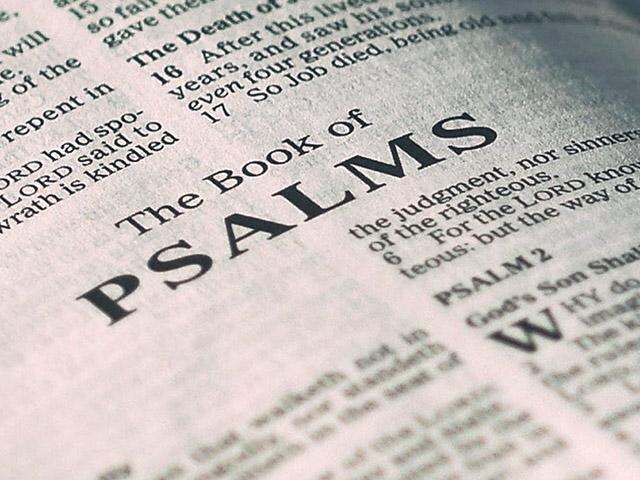By: TJ Gentry, PhD, DMin, PhD Candidate | February 4, 2022
Editorial Note: We give our readers the opportunity to ask questions to our staff. Some of the questions we receive are answered on the podcasts, whereas others are addressed in articles. Recently, we received a question by a person who goes by the name “Studying Rel 2022.” The question reads, “Should Christians pray the imprecatory Psalms?” In responses to this question, Dr. TJ Gentry (Executive VP of Bellator Christi) offers the following response. To ask your question to the Bellator Christi Team, go to https://bellatorchristi.com/submit-a-question-to-bellator-christi/ and fill out the form. Your question could be featured in a future article or featured in an episode of the Bellator Christi Podcast. Now, let us take a look at Dr. Gentry’s response to Studying Rel 2022.
Introduction
Consider the following scenario. An atheist organization contacts the American Civil Liberties Union to begin legal action against a church when it advertises in the local newspaper for an upcoming sermon series about the Christian roots of American government and the need of the current presidential administration to return to those roots. The atheist organization officially and publicly complains that the sermon series violates the separation of church and state required for the church to maintain its tax-exempt status and urges that the church lose such status. After repeated attempts to keep the matter out of the courts, the atheist organization refuses to discuss the situation with the church leadership and presses forward with a costly lawsuit and public attacks. The church calls for a special meeting to discuss the situation and to seek the Lord in prayer.
What type of prayer is appropriate in this situation? May the pastor and the elders of the congregation contemporize the words of Psalm 83:13-17, as the basis of their prayer, asking God to confound and dismay the church’s legal foes so that they become like whirling dust and chaff before the wind? May they ask God to pursue the atheist organization with his tempest and to frighten them with his storm? Could such a prayer be appropriate for those who bear the name of the Prince of Peace and are called to love their enemies and bless those who persecute them? Are such prayers, which seek curses and judgment upon the enemies of God ever allowed for Christians?
This article addresses such concerns, specifically seeking to answer whether Christians should pray the imprecatory Psalms. Beginning with a definition of imprecations and examples of their use in the Psalms, a statement of the ethical problems they pose considering the teaching of the New Testament will be considered. Six different answers to the question of whether Christians should pray the imprecatory Psalms will be developed and summarized, and a conclusion will be offered that attempts to isolate the root issue in determining the appropriateness of imprecatory Psalms for use by Christians. With this as our purpose, we now turn our attention to the definition of an imprecation and examples of imprecations in the Psalms.
What is an Imprecation?
Much like a house is built upon a foundation, the discussion of imprecatory psalms begins with a foundational definition. What is an imprecation? An imprecation is a curse,[1] whereby divine assistance is sought in bringing judgment or calamity upon someone or something. In the context of the book of Psalms, imprecations are found to occupy a central position in Psalms 35, 55, 59, 69, 79, 83, 109, and 137, and may be implied in several others.[2] The idea is that in an imprecatory Psalm the psalmist is lamenting some aspect of either personal or national suffering at the hands of other people or nations, and in the midst of the lament asks God to bring judgment upon those causing the problem.
1. Psalm 35
Consider the language of such prayers. The first example is from the mouth of David in Psalm 35.
Let those be put to shame and brought to dishonor who seek after my life; let those be turned back and brought to confusion who plot my hurt. Let them be like chaff before the wind and let the angel of the LORD chase them. Let their way be dark and slippery, and let the angel of the LORD pursue them…Let destruction come upon him unexpectedly and let his net that he has hidden catch himself; into that very destruction let him fall.[3]
Notice the strong use of cursing, whereby David asks God to bring confusion and unexpected destruction upon his enemies, even resorting to asking that the angel of the LORD pursue them!
2. Psalm 137
A second example is Psalm 137. Though not identified with any author, this Psalm is associated with Judah’s Babylonian Exile in the sixth century B.C.,[4] and its imprecatory language is particularly vivid and disturbing. “Remember, O LORD, against the sons of Edom the day of Jerusalem, who said, “Raze it, raze it, to its very foundation!” O daughter of Babylon, who are to be destroyed, happy the one who repays you as you have served us! Happy the one who takes and dashes your little ones against the rock!”[5] Here the psalmist refers to the happiness of those who repay Babylon, associating such happiness with taking the Babylonian infants and throwing them onto rocks. Surely, none would deny the visceral reaction such imagery evokes, and this in a prayer!
3. Psalm 83
Other examples might be considered, such as the introductory reference from Psalm 83. There the enemies of God’s people are described as “refuse on the earth,”[6] a phrase the Trinity Psalter translates as “dung upon the ground.”[7] Again, we wince to read such earthy language addressed to God.
Harsher language is difficult to conceive of, and it is admittedly difficult to know what to make of it from a New Testament perspective. Thus, having considered the definition of imprecations with special reference to the Psalms, a new question emerges. How can such language be reconciled with the New Testament’s teaching regarding the command to bless our enemies? To this ethical dilemma we now turn our attention.
The Ethical Dilemma Posed by the Imprecatory Psalms
You have heard that it was said, ‘You shall love your neighbor and hate your enemy.’ But I say to you, love your enemies, bless those who curse you, do good to those who hate you, and pray for those who spitefully use you and persecute you, that you may be sons of your Father in heaven; for He makes His sun rise on the evil and the good, and sends rain on the just and on the unjust.[8]
Upon a prima facie consideration of these words of Jesus, one may either pray the imprecations of the Psalter or follow Jesus but reconciling the Lord’s words with a continued practice of imprecations seems impossible. How is it possible to both bless and curse those who are the enemies of God’s people?
Further, Paul’s teaching in Romans 12:14, requiring that Christians, “[b]less those who persecute [them]; bless and do not curse,”[9] is obviously consistent with the teaching of Jesus. If what Jesus taught condemns the practice of praying imprecatory Psalms for Christians, then surely Paul provides a double witness. It seems that taken together, the words of Jesus and Paul force the conclusion that the imprecatory Psalms are not intended for Christians to offer in prayer.
Wrestling with the ethical dilemma posed by the imprecatory Psalms has led some to this conclusion, such as J. Carl Laney of Western Seminary, who stated, “One can appreciate the Old Testament setting of the imprecatory psalms and teach and preach from them. However, like the ceremonial dietary laws of the Old Testament, the imprecations in the Psalms should not be applied to church-age saints.”[10] Are Laney and others with a similar view, correct? Does the ethical dilemma posed by these Psalms justify and even demand their nonuse by believers? Should Christians pray the imprecatory Psalms? That question is the basis for our next section, which will consider six answers offered by those wrestling with these difficult prayers and their use by Christians.
Six Possible Answers to the Question of Imprecatory Psalms[11]
1. Barbaric Religion
The first answer, which assumes a low view of Scripture’s authority and reliability, may be described as the Barbaric Religion answer. [12] In response to the question of whether Christians should pray the imprecatory Psalms, the Barbaric Religion answer is No. This view finds its roots in a commixture of modern psychological theory and higher biblical criticism, resulting in a description of not just the imprecatory Psalms but the entire Psalter as, “a text dominated by primitive and uncontrolled feelings of hatred, a desire for vengeance, and self-righteousness.”[13] In rejecting the imprecatory Psalms as a relic of religiously un-evolved and pre-modern man, one advocate of the Barbaric Religion answer concluded that among modern men it is conceivable that there exists an entire group of people who are morally, “far above…the biblical god”[14] as depicted in the Psalms. Obviously, this answer offers no help to those wrestling with the question of the imprecatory Psalms from an orthodox perspective of Scripture and God. It is mentioned here only because it does have a following among religious liberals, and any biblically conservative person should be aware of the views that will be encountered in this area of discussion.
2. Abrahamic Heirs
The second answer for our consideration is the Abrahamic Heirs answer. Ordinarily this response finds its strongest adherents among those holding to a dispensational hermeneutic of Scripture, with its abiding distinction between God’s purposes for ethnic Israel and the church. According to this view, the imprecatory Psalms are “grounded in the Abrahamic covenant…in which God promised to curse those who cursed Abraham’s descendants. The psalmist, then, merely appealed to God to fulfill His covenant promise to Israel.”[15] Continuing with this line of reasoning, one would necessarily conclude that if the church is not Israel, and therefore not the intended recipient of the promises of the Abrahamic covenant, then the imprecations associated with appeals to the covenant are not hers to make. As concluded by Laney, “In light of the fact that the Abrahamic covenant reflects God’s promises to Abraham and his descendants, it would be inappropriate for a church-age believer to call down God’s judgment on the wicked.”[16] To hold to the Abrahamic Heirs answer is to conclude that the imprecatory Psalms are the exclusive domain of ethnic Israel.[17] Thus, in response to the question of whether or not Christians should pray the imprecatory Psalms, the Abrahamic Heirs answer is No.
3. Sinful Psalmist
A third proposed answer is the Sinful Psalmist answer. This view affirms the authority and reliability of Scripture while admitting the inclusion of sinful statements from otherwise godly individuals.[18] One example cited outside of the Psalms is Job’s errant response to God’s mysterious providence in Job chapters 29-31. Although Job’s words are wrong, he is still a righteous man and his story is divinely inspired revelation. The imprecatory Psalms are explained in a comparable manner. David is a godly man and a type of Christ, but his recorded prayers are not always godly and pointing to Christ. The imprecations, for example, reveal his struggle with vindictiveness and desires for revenge against his persecutors. Rather than providing a model for believers of what to say in prayer, they serve in the opposite way; the imprecations are examples of prayer gone awry. Therefore, in answer to the questions of whether Christians should pray the imprecatory Psalms, the Sinful Psalmist answer is No. The laudable Christian apologist from the last century, C.S. Lewis, concluded as much when reflecting upon the imprecatory Psalms. “The hatred is there –,” Lewis commented, “festering, gloating, undisguised – and also we should be wicked if we in any way condoned or approved it…They are indeed devilish.”[19] Critical of this proposed solution, Longman nonetheless summarized it well, “The psalmist falls short of the Christian ideal because he lived before the time of Christ.”[20]
4. Poetic Prophecy
A fourth proposed answer to the ethical dilemma of the imprecatory Psalms neither attributes these prayers to only Israel nor blames them on a sinful psalmist. Instead, the Poetic Prophecy answer interprets them according to the genres of poetry and prophecy. Like two sides of the same coin, one poetic and one prophetic, this answer looks to these literary genres to alleviate the tension inherent in pleas to God for curses upon an enemy.[21] For example, regarding the poetic aspect, Catholic theologian Erich Zenger concluded,
“What is true of the psalms as a whole must be considered and savored in a special way in the psalms of enmity: They are poetry, and as poetry they live out of and within their manifold imagery, in which they concentrate experiences and attempt to convey them in their depth and enduring vitality, and in which they paint and invoke the dramatic anxieties and erupting agonies, as well as the brutality of hostile power and their hopes for the intervention of the God who can put an end to this vicious circle of violence.”[22]
Accordingly, appeals to regard the enemies of God as dung and to cast their babies on rocks are best understood, not as literal requests, but as the poetic use of hyperbole. The spirit of the prayer is what counts, but the letter is not to be taken in a wooden manner.
The prophetic aspect of the Poetic Prophecy answer attempts to alleviate the difficulty of the imprecatory Psalms by attributing their words to the realm of prophetic foretelling. Sometimes the prophecy is related to a future judgment on the enemies of God in general, and sometimes it is related to Jesus and his suffering.[23] An example of the former is Psalm 52:5, where the promise that, “God shall likewise destroy [the wicked] forever; He shall take [them] away,” is understood as descriptive of the future judgment of the wicked in general. An example of the latter is found in Psalms 35:19 and 69:4, referred to by Jesus as the explanation of the world’s hatred toward him.[24] This prophetic foretelling approach, coupled with the imaginative use of poetic language, leads the Poetic Prophecy view to an answer of Yes, to the question of whether Christians should pray the imprecatory Psalms. It is a qualified Yes, however, as far as the use of the imprecatory Psalms is never to be specific about persons or situations, and the prayers that spoke of Jesus are studied as prophecy but not modeled in prayer.
5. Immature Ethic
The Immature Ethic answer is the fifth answer for our consideration. This view of the imprecatory Psalms sees them as genuine and appropriate expressions of prayer for Old Testaments saints whose ethic was immature as far as Christ had not yet come and the Holy Spirit had not been poured out as in the New Covenant. Thus, the psalmist was given to hate both sin and sinner;[25] whereas in the New Testament a mature ethic has come that calls for a hatred for sin but love for sinners. Love for enemies, prayerfully expressed is the New Testament norm. In this mature context the imprecatory Psalms are no longer appropriate. According to Zuck, “the Old Testament is on a lower moral plane than the New Testament…the Old Testament never speaks of forgiving or loving avowed enemies of God.”[26] Consequently, the Immature Ethic answers No, to the question of whether Christians should pray the imprecatory Psalms.
6. Covenantal Maturity
A sixth answer to the dilemma of the imprecatory Psalms, and the final one for our consideration, is the Covenantal Maturity answer. This view answers Yes, to the question of whether Christians should pray the imprecatory Psalms. Like the Poetic Prophecy answer above, the Covenantal Maturity’s Yes, is qualified but in diverse ways and for several reasons. This view presupposes a covenantal rather than a dispensational hermeneutic, leading away from any abiding distinction between Old Testament Israel and the church and toward more continuity. Israel and the church are related insofar as the former is the underage expression of the latter, but there is no essential difference, save in the administration in each instance of the one redemptive mission of salvation by grace through faith in Christ.[27] The view espouses that Old Testament Israel was saved looking forward to Christ to come, and that the church is saved looking back to Christ who has come.
In terms of the imprecatory Psalms this means that what was prayed by David regarding Doeg the Edomite in Psalm 52 may now be prayed by Christians with a view to ungodly organizations like the American Civil Liberties Union. The sentiment is the same but the names are changed. The logic is that if it was appropriate for Israel underage, then it is appropriate for the church as Israel come of age. As Lessing stated, “Paul makes it clear in Galatians 3:29 that the [Christians] ‘belong to Abraham’s seed, [and are thus] heirs according to the promise.’ As heirs of Abraham through Christ we are heirs of Yahweh’s promises of blessing and cursing. It should not surprise us, therefore, that the theology of imprecation appears in many places in the New Testament.”[28] The one substantive qualifier is that now, prayers for destruction are joined with prayers for conversion. As Luther said, “We should pray that our enemies be converted and become our friends and, if not, that their doing and designing be bound to fail and have no success and that their persons perish rather than the Gospel and the kingdom of Christ.”[29]
When asked how such an approach meshes with the commands by Jesus and Paul quoted above that require blessing and not cursing toward enemies, the Covenantal Maturity view highlights the unresolved tension between cursing and blessing in the New Testament created by instances of church discipline, such as in the Corinthian example of a man having his father’s wife.[30] Carrying out Paul’s command to, “with the power of our Lord Jesus Christ, deliver such a one to Satan for the destruction of the flesh,”[31] seems to require some form of imprecatory prayer. By the analogy of faith in interpretation, which makes Scripture its own interpreter, advocates of the Covenantal Maturity view insist that whatever is commanded by Paul in this passage to the Corinthians is consistent with his command to extend blessing to enemies in Romans 12. Blessing and cursing are not mutually exclusive; circumstance is the key to interpreting the difference. The same logic is used when considering the teaching of Jesus. As Day has argued,
Though some New Testament passages seem to contradict the cry of the imprecatory psalms, other verses confirm it. The tension between “loving” and “cursing” can be harmonized and must be properly dealt with by God’s people in whatever dispensation they are found. As the character of God does not change, so the essence of God’s ethical requirements does not change. Therefore, as the imprecatory psalms were at times appropriate on the lips of Old Testament believers, so they are at times appropriate on the lips of New Testament believers as well.[32]
Summary of the Six Answers
Coming to the end of this overview of six answers to the question of whether Christians should pray the imprecatory Psalms, the following summary of each answer is offered. First was the Barbaric Religion answer, which said No, the imprecatory Psalms should not be prayed by Christians. Such prayers are the remnant of an un-evolved and pre-modern ethic. Second was the Abrahamic Heirs answer, which also said No to imprecatory Psalms for Christians. These prayers are the exclusive domain of ethnic Israel as the covenantal heirs of the promised blessings and curses to Abraham. Third was the Sinful Psalmist answer, which gave another No. Such prayers are the sinful expression of David and others whose example should not be followed. Fourth was the Poetic Prophecy answer, which offered the first Yes, to the question of Christians praying the imprecatory Psalms. As far as these prayers are understood as mostly poetic expressions of Messianic prophecies filled with hyperbole and pointing to the destruction of evil at the last day they serve as a broad pattern for Christian prayer. Fifth was the Immature Ethic answer, bringing another No. The imprecatory Psalms are the expression of an immature Old Testament ethic that is replaced by a New Testament ethic of love for enemies. Sixth was the Covenantal Maturity answer and another Yes, to the imprecatory Psalms for Christians. Building from the idea that Old Testament Israel was the church underage but now the church is Israel come of age, these prayers provide a pattern for expressing the tension between blessing and cursing found in such instances as church discipline and attacks against believers by ungodly organizations.
Conclusion
The preceding material briefly addressed whether Christians should pray the imprecatory Psalms. Beginning with a definition of imprecations and examples of their use in the Psalms, a statement of the ethical problems they pose alongside of the teaching of the New Testament was considered. Six different answers to the question of whether Christians should pray the imprecatory Psalms were discussed and summarized.
Considering the several possible conclusions that might be drawn concerning the use of imprecatory Psalms, the following questions are offered to help readers decide for themselves.
- Do you believe the religion of the Old and New Testament is true and reveals a God who is a loving and just and who does not stand in need of evolutionary modernistic religious thought to be acceptable? If so, then the Barbaric Religion answer to the imprecatory Psalms cannot be correct.
- Do you believe that David had many good intentions but often practiced bad expression, such that his prayer life was transparently sinful at time? If so, then the Sinful Psalmist conclusion may be your answer to the imprecatory Psalms query.
- Do you believe that God has distinct but related plans of salvation for ethnic Israel and the church, which plans flow from the promise to Abraham and are revealed through different ethical requirements in the Old and New Testaments? If so, then the Abrahamic Heirs answer or the Immature Ethic answer (or some combination of the two) is appropriate for your consideration of the imprecatory Psalms.
- Do you believe that God’s purpose is the same for both Old Testament Israel and the church, as far as the former is the underage expression of the latter and that the principal pattern for prayer given in the imprecatory Psalms is consonant with the New Testament tension between blessing and cursing? If so, then the Poetic Prophecy answer or the Covenantal Maturity answer (or some combination of the two) is your choice for the question of the imprecatory Psalms.
Regardless of the answer you choose, the imprecatory Psalms are important for Christians who take seriously the Bible and its role in approaching God in prayer. Whether you learn to mimic the imprecatory Psalms as your own expression or teach from them as a springboard to consider newer and better or different realities for the church-age, these prayers are included in the canon of Scripture for a good reason. Let it be that God enables his people to be consistent with their theological presuppositions and the liturgical implications drawn from them, so that he may be approached in prayer in a manner respecting his inspired Word and conscious of the words of his servants in every age.
About the Author

Dr. Thomas J. Gentry (aka., TJ Gentry) serves as the pastor of First Christian Church of West Frankfort, Illinois, the Executive VP of Bellator Christi Ministries, and the Executive Editor of MoralApologetics.com. Dr. Gentry is a world-class scholar holding 5 doctorate degrees and 6 masters degrees. Additionally, he is a prolific writer as he has published 7 books including Pulpit Apologist, Absent from the Body, Present with the Lord, and You Shall Be My Witnesses: Reflections on Sharing the Gospel. Be on the lookout for two additional books that he will soon publish. In addition to his impressive resume, Dr. Gentry proudly served his country as an officer in the United States Army and serves as a martial arts instructor.
Notes
[1] C. Hassell Bullock, Encountering the Book of Psalms: A Literary and Theological Introduction (Grand Rapids, MI: Baker, 2001), 228.
[2] Ibid.
[3] Psalm 35:4-6, 8 (NKJV).
[4] David E. Garland and Tremper Longman, III, eds., Psalms. The Expositor’s Bible Commentary (Grand Rapids, MI: Zondervan, 2008), 949.
[5] Psalm 137:8-9.
[6] Psalm 83:10.
[7] Trinity Psalter (Pittsburg, PA: Crown and Covenant Publications, 1994), 72.
[8] Matthew 5:43-45.
[9] Romans 12:14.
[10] J. Carl Laney, “A Fresh Look at the Imprecatory Psalms,” Bibliotheca Sacra 138, no. 549 (January 1981): 44.
[11] The labels given to the six proposed answers are original to me (as far as I know), but the ideas they represent are not. Every attempt has been made to give proper credit for the source(s) of each answer considered. Some of the answers are a composite of more than one as found in related literature; they are here combined for the sake of expediency.
[12] It is important to note at the outset that, although the language of inerrancy and infallibility may not be specifically articulated by advocates of the various answers proposed hereafter, except for the first one each answer assumes a high view of the authority and reliability of Scripture. One might conclude, therefore, that the discussion of what, if any continuing role the imprecatory Psalms play is held among those who take the Bible seriously and want to properly submit to its authority and apply its teachings.
[13] Gary A. Anderson, “King David and the Psalms of Imprecation,” Pro Ecclesia 15, no. 3 (2006): 268.
[14] Ibid.
[15] Laney, “A Fresh Look,” 43.
[16] Ibid., 44.
[17] It is worth noting what the first two answers have in common. On one level, both the Barbaric Religion answer and the Abrahamic Heirs answer give serious weight and moment to these prayers. In the former instance, they are taken seriously as far as they must be rejected outright as an expression of immature religion. They are, however, real prayers that must be taken seriously. In the latter instance, they are taken seriously as far as they must be reserved for their use by the proper heirs of the Abrahamic covenantal promises. Again, they are to be taken seriously as legitimate responses to those who attack the ethnic descendants of Abraham. This point in similarity is mentioned, not to besmirch a viable orthodox view by associating it with a liberal error, but to remind us that these Psalms pose a legitimate ethical challenge for anyone who reads the Bible.
[18] Bullock, Encountering the Psalms, 231.
[19] C.S. Lewis, Reflections on the Psalms (New York, NY: Harcourt Brace Jovanovich, 1958), 22, 25.
[20] Tremper Longman, III, How to Read the Psalms (Downers Grove, IL: InterVarsity, 1988), 138-139.
[21] This is not to say that the other proposed solutions do not recognize poetic and prophetic structures and elements in the imprecatory Psalms. The difference lay in the emphasis given these two genres by the Poetic Prophecy answer.
[22] Erich Zenger, God of Vengeance? Understanding the Psalms of Divine Wrath, trans. Linda M. Maloney (Louisville, KY: Westminster John Knox, 1996), 76.
[23] Bullock, Encountering the Book of Psalms, 230-231.
[24] Ibid., 230.
[25] John N. Day, Crying for Justice: What the Psalms Teach Us About Mercy and Vengeance in an Age of Terrorism (Grand Rapids, MI: Kregel, 2005), 28.
[26] Roy B. Zuck, “The Problem of the Imprecatory Psalms,” (Th.M. thesis, Dallas Theological Seminary, 1957), 70, 60.
[27] Westminster Standards (Suwanee, GA: Great Commission Publications, 2008), 20. Examples of the difference in administration of the one redemptive mission include circumcision as replaced by baptism, Passover as replaced by the Lord’s Supper, and physical sacrifice in worship as replaced by a spiritual sacrifice of praise and thanksgiving. The substance of the salvation in either instance is the same, as it is and was understood to be found in Christ and given to the same covenant people. This position adopts the view that Israel and the church are the same. The church does not replace Israel; she is Israel come of age.
[28] Reed Lessing, “Broken Teeth, Bloody Baths, and Baby Bashing: Is There Any Place in the Church for Imprecatory Psalms?,” Concordia Journal 32, no. 4 (October 1, 2006): 369.
[29] Jaroslav Pelikan and A.T.W. Steinhaeuser, eds., Luther’s Works, vol. 21, The Sermon on the Mount and the Magnificat (St. Louis, MO: Concordia, 1956), 1000.
[30] 1 Corinthians 5:1-5.
[31] 1 Corinthians 5:4-5.
[32] John N. Day, “The Imprecatory Psalms and Christian Ethics,” Bibliotheca Sacra 159, no. 634 (April 1, 2002): 168.
Copyright, 2022. Bellator Christi.






Imprecation is very well defined and presented!
[…] Source: Can We Say That to God? Christians and the Imprecatory Psalms […]